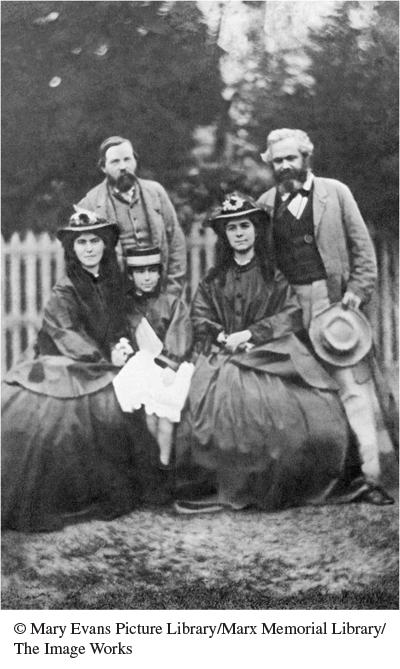The Birth of Marxist Socialism

Karl Marx and His Family Active in the revolutions of 1848, Marx fled Germany and eventually settled in London, where he wrote Capital, the weighty exposition of his socialist theories. Despite his advocacy of radical revolution, Marx and his wife, Jenny, pictured here with two of their daughters, lived a respectable though modest middle-class life. Standing on the left is Friedrich Engels, an accomplished writer and political theorist who was Marx’s long-time friend, financial supporter, and intellectual collaborator.
(© Mary Evans Picture Library/Marx Memorial Library/The Image Works)
In the 1840s France was the center of socialism, but in the following decades the German intellectual Karl Marx (1818–1883) would weave the diffuse strands of socialist thought into a distinctly modern ideology. Marxist socialism — or Marxism — would have a lasting impact on political thought and practice.
The son of a Jewish lawyer who had converted to Lutheranism, the young Marx was a brilliant student. After earning a Ph.D. in philosophy at Humboldt University in Berlin in 1841, he turned to journalism, and his critical articles about the laboring poor caught the attention of the Prussian police. Forced to flee Prussia in 1843, Marx traveled around Europe, promoting socialism and avoiding the authorities. He lived a modest, middle-class life with his wife, Jenny, and their children, often relying on his friend and colleague Friedrich Engels (see Chapter 20) for financial support. After the revolutions of 1848, Marx settled in London, where he spent the rest of his life as an advocate of working-class revolution. Capital, his magnum opus, appeared in 1867.
Marx was a dedicated scholar, and his work united sociology, economics, philosophy, and history in an impressive synthesis. From Scottish and English political economists like Adam Smith and David Ricardo, Marx learned to apply social-scientific analysis to economic problems, though he pushed these liberal ideas in radical directions. Deeply influenced by the utopian socialists, Marx championed ideals of social equality and community. He criticized his socialist predecessors, however, for their fanciful utopian schemes, claiming that his version of “scientific” socialism was rooted in historic law, and therefore realistic. Following German philosophies of idealism associated with Georg Hegel (1770–1831), Marx came to believe that history had patterns and purpose and moved forward in stages toward an ultimate goal.
Bringing these ideas together, Marx argued that class struggle over economic wealth was the great engine of human history. In his view, one class had always exploited the other, and with the advent of modern industry, society was split more clearly than ever before: between the upper class — the bourgeoisie (boor-ZHWAH-zee) — and the working class — the proletariat. The bourgeoisie, a tiny minority, owned the means of production and grew rich by exploiting the labor of workers. Over time, Marx argued, the proletariat would grow ever larger and ever poorer, and their increasing alienation would lead them to develop a sense of revolutionary class-consciousness. Then, just as the bourgeoisie had triumphed over the feudal aristocracy in the French Revolution, the proletariat would overthrow the bourgeoisie in a violent revolutionary cataclysm. The result would be the end of class struggle and the arrival of communism, a system of radical equality.
Fascinated by the rapid expansion of modern capitalism, Marx based his revolutionary program on an insightful yet critical analysis of economic history. Under feudalism, he wrote, labor had been organized according to long-term contracts of rights and privileges. Under capitalism, to the contrary, labor was a commodity like any other, bought and sold for wages in the free market. The goods workers produced were always worth more than what those workers were paid, and the difference — “surplus value,” in Marx’s terms — was pocketed by the bourgeoisie in the form of profit.
According to Marx, capitalism was immensely productive but highly exploitative. In a never-ending search for profit, the bourgeoisie would squeeze workers dry and then expand across the globe, until all parts of the world were trapped in capitalist relations of production. Contemporary ideals, such as free trade, private property, and even marriage and Christian morality, were myths that masked and legitimized class exploitation. To many people, Marx’s argument that the contradictions inherent in this unequal system would eventually be overcome in a working-class revolution appeared to be the irrefutable capstone of a brilliant interpretation of historical trends.
When Marx and Engels published The Communist Manifesto on the eve of the revolutions of 1848, their opening claim that “a spectre is haunting Europe — the spectre of Communism” was highly exaggerated. The Communist movement was in its infancy. Scattered groups of socialists, anarchists, and labor leaders were hardly united around Marxist ideas. But by the time Marx died in 1883, Marxist socialism had profoundly reshaped left-wing radicalism in ways that would inspire revolutionaries around the world for the next one hundred years.
